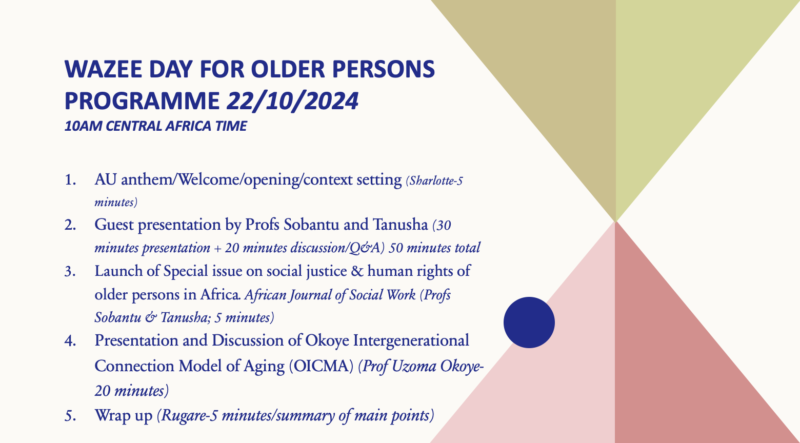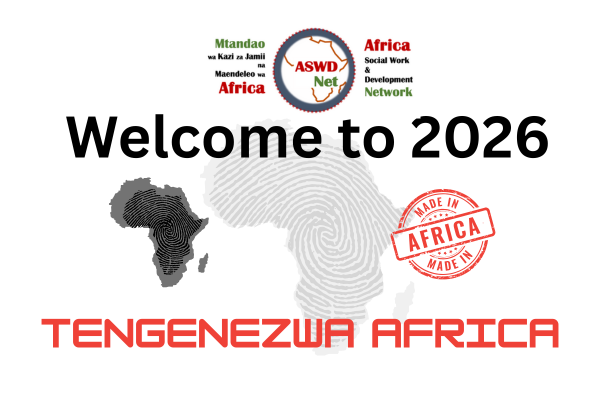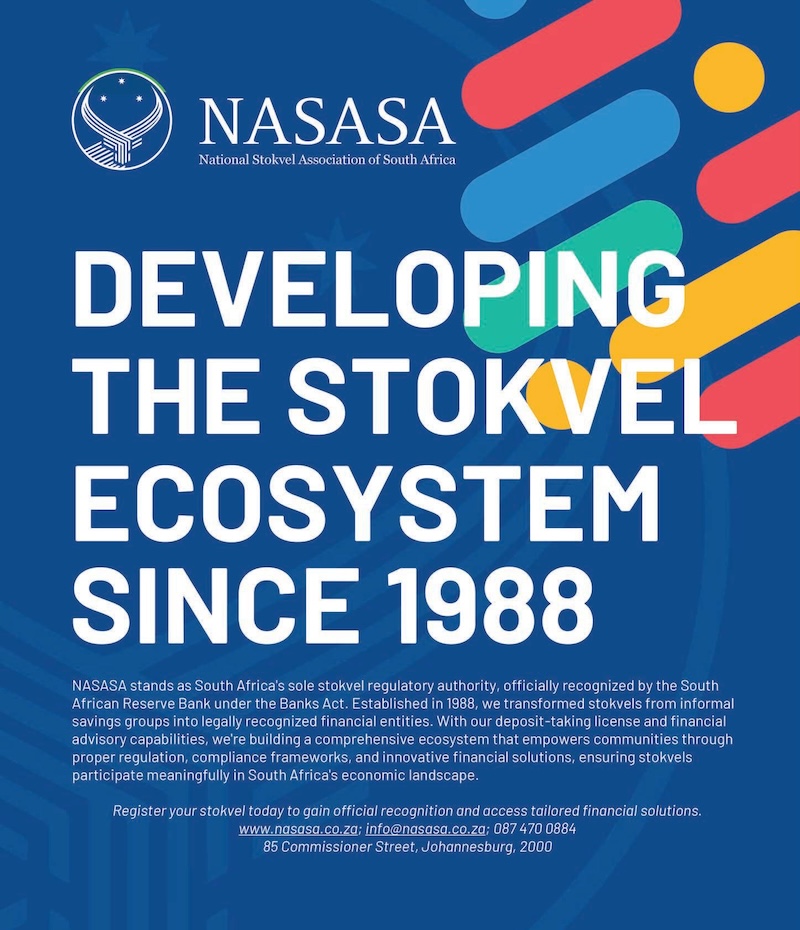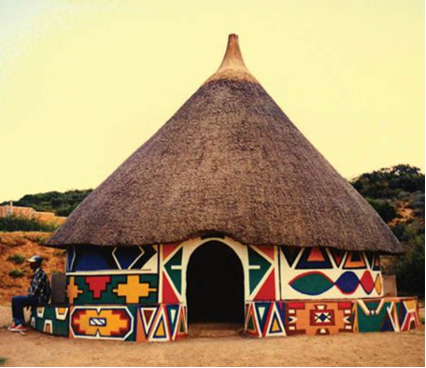
Wazee Indaba – Day for Older Persons 2024
22 October 2024, 10am Central Africa Time
Program
- AU anthem/Welcome/opening/context setting (Sharlotte-5 minutes)
2. Guest presentation by Profs Sobantu and Tanusha (30 minutes presentation + 20 minutes discussion/Q&A) 50 minutes total
3. Launch of Special issue on social justice & human rights of older persons in Africa. African Journal of Social Work (Profs Sobantu & Tanusha; 5 minutes)
4. Presentation and Discussion of Okoye Intergenerational Connection Model of Aging (OICMA) (Prof Uzoma Okoye-20 minutes)
5. Wrap up (Rugare-5 minutes/summary of main points)
Poster

Special Issue on Social Justice & Human Rights of Older Persons in Africa
Guest Editors
RANIGA Tanusha, PhD (Social Work), Centre for Social Development in Africa, University of Johannesburg, South Africa. traniga@uj.ac.za
SOBANTU Mziwandile, PhD (Social Work), Department of Social Work and Community Development, University of Johannesburg, South Africa. msobantu@uj.ac.za
GEYER Stephan, PhD (Social Work), Department of Social Work and Criminology, University of Pretoria, South Africa. stephan.geyer@up.ac.za
Okoye Intergenerational Connection Model of Aging (OICMA)
The six (6) components of ICMA by Uzoma Odera Okoye’s are:
- Sankofa na Mmadu (Intergenerational solidarity): Positive relationships between older adults and youth.
- Mzuri wa Mzee (Goodness of the Elder): Older adults provide wisdom, experience, and emotional support.
- Igwebuike (Coming Together): Intergenerational relationships facilitate the transfer of cultural values.
- Sema (Speak with and educate the youth): Educating youth about aging, ageism, and elder abuse.
- Kuleta kwa Jamii (Gathering of the community): Governments and organizations implement initiatives that bring generations together.
- Ibuanyidanda (Social Support): Key to successful aging lies in the quality and number of informal social support available to older adults.
Questions to help you reflect on this theory
- On a scale of 1-10, how much does this theory relate to the experiences of your African family or community?
- What are the best aspects of this theory?
- On a scale of 1-10, how likely are you to recommend this theory to a practitioner, educator or researcher on the topic?
- Where would the theory be most and less useful?
- How can the theory be strengthened?
Statement on the Celebration of the 2024 Edition of International Day of Older Persons
Issued by African Commission on Human and Peoples’ Rights (ACHPR) on 01 October 2024, one of the organs of the AU.

Disabilities in Africa (the Working Group), in its capacity as a Special Mechanism of the African Commission on Human and Peoples’ Rights, celebrates the 34th Edition of International Day of Older Persons, under the theme of ‘Ageing with Dignity: The Importance of Strengthening Care and Support Systems for Older Persons Worldwide’
This day serves as a powerful reminder of our collective responsibility to ensure that older persons live their later years with respect, security, and the necessary support. On this occasion, the Working Group on the Rights of Older Persons and Persons with Disabilities in Africa reiterates its commitment to States Parties to recognize the rights of older persons in society and to promote a more inclusive society where older persons are valued and respected.
As the global population ages, the need for robust health and care systems has never been more urgent. Millions of older persons on the African continent face challenges ranging from inadequate healthcare to social isolation. Therefore, the Working Group continues its active sensitization activities with States to gather the necessary ratifications for the entry into force of the Protocol to the African Charter on the Rights of Older Persons to guarantee them full and complete protection of their rights.
Consequently, the Working Group takes advantage of this 34th commemoration of the International Day for Older Persons to urge States that have not yet done so to proceed very quickly with the ratification of the said Protocol and its deposit with the Commission. It should be recalled that only one ratification and deposit of the instrument of ratification is required for the Protocol to enter into force, as was recently the case for the Protocol on Persons with Disabilities (which entered into force on 3 May 2024).
On the occasion of this day, the Working Group expresses its solidarity with all older persons on the continent and urges all States to take greater ownership of the challenges related to the health care and social protection of older persons, which ensure them a quality and dignified old age in accordance with articles 7, 10, 11 and 15 of the Protocol on the Rights of Older Persons.
By investing in comprehensive care frameworks, we can guarantee older persons the dignity and support they deserve. To achieve this, we must prioritize several key areas:
- Access to quality healthcare: It is essential to ensure that older persons have access to comprehensive and affordable healthcare. This includes preventive services, chronic disease management, and mental health support.
- Supportive living environments: We must advocate for communities adapted to older persons that facilitate a safe and independent life. Accessible housing, transportation, and social services are essential components of a supportive environment.
- Skilled care workforce: It is crucial to strengthen the training and capacities of caregivers. A well-equipped workforce is essential to provide compassionate and person-centred care that meets the diverse needs of older persons.
- Social inclusion: Promoting social relations and inter-generational engagement is essential to combat loneliness and foster a sense of belonging. We must create opportunities for older persons to contribute to society with their knowledge and experiences.
Investments in these areas not only support older persons but also strengthen our communities as a whole through the immense benefit that these communities can draw from the undeniable knowledge and experience of older people.
In Africa, ageing is a grace; at the African Commission on Human and Peoples’ Rights, we add that “ageing well is a collective responsibility”.
The Working Group wishes all older persons a happy celebration of the 2024 Edition of the International Day dedicated to them, and reaffirms its commitment to stand by their side until their full potential and possible contribution to our communities are known and valued accordingly.
Done in Banjul on October 1, 2024
For the Working Group,
The Honourable Commissioner Marie-Louise Abomo, Chairperson
Use the form below to subscibe to Owia Bulletin.
Discover more from Africa Social Work & Development Network | Mtandao waKazi zaJamii naMaendeleo waAfrika
Subscribe to get the latest posts sent to your email.




You must be logged in to post a comment.